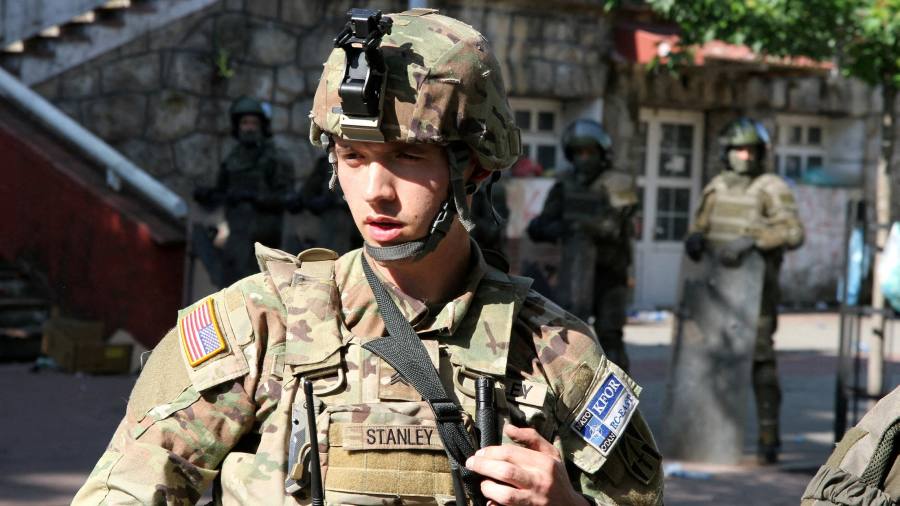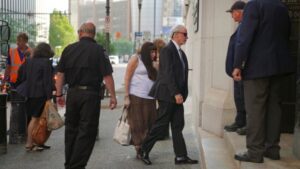
The US has outlined punitive actions against Kosovo for stoking ethnic tensions that led to Nato peacekeepers and Serb protesters being injured in the worst clashes taking place in the Balkan country this year.
Kosovo authorities deployed police over the weekend to ensure that ethnic Albanian mayors who had won a disputed April election take up their offices in majority-Serb communities in the north of the country. Hundreds of Serbs took to the streets and clashed with national and international law enforcement personnel on Monday — resulting in more than 50 protesters and 30 Nato troops being injured.
“The actions taken on Friday to gain access to public buildings were not co-ordinated with the US,” said the US ambassador to Pristina, Jeff Hovenier. “When we found out we strongly said no because we foresaw the consequences we are seeing now”, he said adding that they had warned Kosovo of the “negative impact” on its image and on efforts to normalise relations with Serbia.
Washington is traditionally a strong ally of Kosovo, whose independence is still not recognised by Serbia and a handful of EU countries.
Hovenier said the US will cancel Kosovo’s participation in joint military drills and put diplomatic meetings on hold. Washington will also stop advocating for Kosovo’s coveted membership in international organisations like the United Nations or the European Union.
“I would be surprised if, in this situation, Kosovo officials would visit the US,” Hovenier said.
Separately, Nato announced it would deploy an extra 700 troops to maintain peace in the country to bring the overall number of peacekeepers to around 4,500.
“We strongly condemn the unprovoked attacks,” Nato secretary-general Jens Stoltenberg told a press conference in Oslo on Tuesday. “Such attacks are unacceptable and must stop . . . Violence sets back Kosovo and the entire region and puts euro-Atlantic ambitions at risk.”
Pristina and Belgrade reached a tentative agreement to normalise relations in March which included more rights for the ethnic Serb minority. That deal is now under threat, with possible knock-on effects for the stability of the region.
“The process is badly damaged,” said Edward P Joseph, a Balkans expert at Johns Hopkins University in the US. “I hope the . . . agreement is not dead but such irresponsible behaviour makes these agreements exceedingly difficult to implement.”
EU top officials have also condemned the violence. “Violent acts against citizens, against media, against law enforcement and [Nato] troops are absolutely unacceptable and bring us to a very dangerous situation,” Josep Borrell, the EU’s foreign policy chief, said on Tuesday.
EU member states were discussing “possible measures to be taken if the parties continue to resist proposed steps towards de-escalation”, Borrell added. “We cannot afford another conflict.”
Further stoking tensions was Serbian tennis player Novak Djokovic, who on Monday wrote a message on a camera after winning a French Open match: “Kosovo is the heart of Serbia. Stop the violence.”
Kosovo’s president Vjosa Osmani claimed that Serbia was destabilising its southern neighbour.
“Serb illegal structures turned into criminal gangs have attacked Kosovo police, KFOR [peacekeeping] officers and journalists,” Osmani wrote on Twitter. He also alleged they were carrying out the orders of Serbian president Aleksandar Vučić, without substantiating the claim.
Kosovo’s prime minister Albin Kurti maintained a defiant tone on Tuesday. While condemning the violence and thanking Nato, he blamed “rightwing extremist groups donning masks who vandalise, attack, burn everything that they do not consider Serbian”. Kurti pledged “unconditional support” for the Albanian mayors who “are still the only ones who have any legitimacy to be in municipal buildings and at the service of citizens”.
Kurti also condemned Serbs spray-painting Nato vehicles with the letter Z, a Russian marking used since Moscow’s full-scale invasion of Ukraine. Kosovo Serbs deny ties to Russia but many harbour sympathies with Moscow, long a Slavic ally of Belgrade.
The tensions also come at a time when president Vučić faces increased domestic pressure after thousands have taken to the streets in recent days to protest against the government’s response to deteriorating public safety after two mass shootings.
Vučić, who has raised the Serbian army’s combat readiness to the highest level, made an overnight visit to troops close to the Kosovo border. He also held meetings with the ambassadors of Russia and China as well as those from the US, UK, France, Germany and Italy.
“[Kosovo] just complicates his situation,” said Milos Damnjanovic, an analyst with the BIRN consultancy in Belgrade. “He has too many crises to juggle. Escalation is only useful to Vučić if he comes out stronger but the situation in Kosovo is largely out of his control.”

